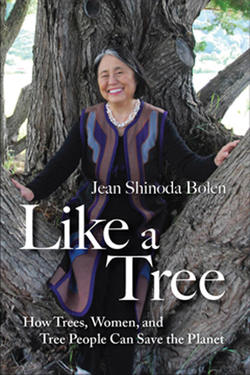Читать книгу Like a Tree - Jean Shinoda Bolen - Страница 14
На сайте Литреса книга снята с продажи.
Activism with Heart
ОглавлениеAs I learn about trees and what is happening to them, other concerns and thoughts come together: trees, global warming, effects on the soil and on animal life and on the most vulnerable people on the planet (impoverished women and children—especially girl children), as a result of corporate emphasis on short-term bottom lines, and my own collusion through what I eat, buy, and do. I come to a mental discomfort zone in myself that is familiar. With consciousness comes choice, with choice comes responsibility to do something. There is so much to do, so many causes and appeals. Just as the seed for this book was the destruction of one tree that was special to me, ripples of thought associations result from what I learn about what I could do, what others I know are doing, and how doing something rather than nothing does feel better. Also, whatever any of us does, if it comes from the heart and, I'd add, from a depth of feeling for what needs help and therefore from who we are, then what we do and how much is the next right action for us.
In 2006, Rebecca Hosking was horrified at seeing hundreds of bird carcasses dead from plastic bags lodged in their stomachs, went to her hometown of Modbury, England, and persuaded all of its forty-three shopkeepers to agree to a plastic-bag ban (Adams, “Rebecca Hosking: Banning Plastic Bags,” Time, 2009, p. 52). One appalled and compassionate woman led the way; by 2009, eighty other towns in the United Kingdom had followed suit. In 2007, San Francisco Supervisor Ross Mirkarimi's proposal banning plastic bags and requiring recyclable or compostable sacks passed to make San Francisco the first city in the United States to do so. Where I live, the grocery checkout line becomes a moment of choice: paper or plastic? (Trees or birds?) My solution, a large colorful and reusable bag that proclaims: “I used to be a plastic bottle.”
Ever since I wrote Urgent Message from Mother: Gather the Women, Save the World, I've been a message carrier out in the world, saying, “Mother Wants You!” But consistent with the individuation work I do as a Jungian analyst, I speak of how important it is to take on what you recognize as being your particular assignment, and not something others say you ought to do. I think that when an assignment comes along with your name on it, you can recognize it by your answers to three questions that only you can answer: “Is this meaningful?” Every good cause is meaningful, but is this one meaningful to you? “Will it be fun?” Not to underestimate that it will be work, may take courage, and may mark you as weird, but to make the point: will you be in good company, are these people with whom you can laugh and cry, work through difficulties, and stand shoulder to shoulder? Fun also has to do with tapping into your creativity and using who you are for a cause close to your heart. And last, “Is it motivated by love?” Love of what or whom you care about and want to help or save generates energy; success is measured by your heart in the small stories as well as in achieving goals.
You may not feel a strong, inaudible call to your activist soul when the desire to make a difference and ways to do so grows slowly, one step at a time. Many activists began as volunteers, recruited from the sidelines. When help was needed, they showed up. Activism often begins by doing one thing, and then the next right thing. It may begin with emails that raise your hackles or your consciousness, or calls to your compassionate heart. The first active step may be the petitions you sign and the donations you make. It may lead to going to meetings or a conference. One thing leads to another and you find your assignment. However you get there, once you recognize and commit to your assignment, it will likely take more than you expected and give more in return.
